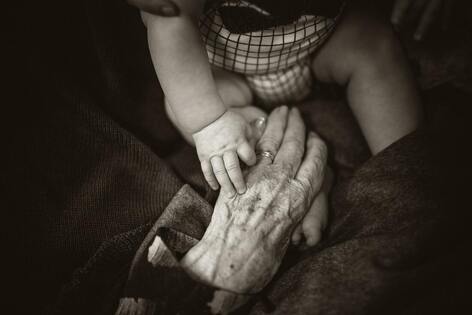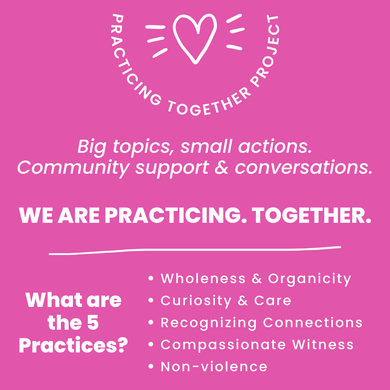Today's Guest Interview is with Joy MacTavish, a person who knows more about babies and milk making than anyone I've met! I've known Joy for quite some time through my work as a birth doula in the Seattle area, and later through our local homeschooling community. Joy's care for the parents she works with is so genuine and lovely. She is truly just a positive, kind, and upbeat person and honestly, a literal *joy* to spend time with! She shares vulnerably here about birth and death, her sweet Nana, and so much more. I think you will enjoy reading about Joy's relationship to play, perfectionism, and grief. Leave a comment and share your thoughts, or share your answers to the questions Joy chose.  What are some things you have done in your life that you are truly proud of? Two things that I have done in my life that I am truly proud of include both ends of the life span. From 2007-2013, I was a birth doula and attended many births during that time. In 2013 and 2019, I birthed two of my own babies in amazing and empowering homebirths. Birth, however it unfolds, is a time of immense fortitude, transformation, and hope for the future. The process often requires the birth giver (and their support people), to look inward, to evaluate, and journey through doubts, before coming out the other side and being forever postpartum, forever changed. On the other end of the life span, I experienced being with my nana, my maternal grandmother, during her death. I was extremely close to her all my life. She helped raise me and was always an anchor for me. She taught me resilience through stories of immigrating to the U.S., having four kids in five years, and then becoming a widow suddenly while her children were still young. While I never met my late grandfather, she told me stories about him and their love, and how much they both valued education. That foundation is one of the main reasons I have two bachelors and a masters degree. She was always so encouraging about my studies and I knew how proud she was of me and who I became. Last year, she had a fall and died suddenly, but I will be eternally grateful to have had the honor of being with her in the hours before and while she passed. I am proud of myself for having the awareness of the magnitude of those moments, and the composure to make it through them. Birth and death are both thought of as liminal spaces. Experiences where the distance between one side or destination and the next can be felt. A threshold. I feel proud of having crossed these various thresholds in life and of the lessons I have learned as a result of them. When/how do you find time to play? When I was a child, my mom would play elaborate imaginative games with me. We created entire worlds of characters and acted out scenes with a favorite doll, Annie, and each other. We went on adventures and told stories about silly things Annie could have done there. This playfulness was such a core part of my childhood and I feel grateful to have these memories. Now as an adult and a mama of two boisterous, playful children, I think about play often. Honestly, sometimes I find it hard to get in touch with my playful side. I enjoy reading and playing board games with my children, but the imaginative stories and role playing games feel more elusive for me. I have determined that part of that is my mental load, a feeling of busy-ness. As a mom who homeschools and is self-employed, I am susceptible to feeling that I need to focus on certain areas before I can play. While I recognize and value play as the work of children, I also believe that play is good for us all. A while back, my eight-year-old told me how much he loves playing with me, and asked me to play with him more. In that moment, I realized that I needed to reprioritize play. Play with my children, which I dearly love once I can tune into and move through the “should” and mental resistance. And play of my own, whether that means fun, decompression activities of my choice, things I love that bring excitement and curiosity, or simply tapping into a more playful attitude. What are your thoughts about or relationship to grief? I believe that grief is a part of life, inescapable for those of us who are able to connect with others and ourselves. We all experience losses and transitions in life; some big, some small. We don’t always recognize and honor these losses, and when we do they can be felt with different levels of intensity. As I shared above, last year I experienced the deepest and most profound grief when my nana died. All my life she was an anchor, and her absence was heart-wrenching. In fact, I don’t think I understood the true meaning of the phrase “heart-wrenching” until I experienced that level of grief. My experience of grief up until then had been more superficial. Present, true, but not as deep. I’ve lived through other life events, the passing of other relatives and family friends, the death of our fourteen year old dog, loss of friendships. Those all touched me, but not to the extent that I viscerally felt like a part of me had been taken. After some significant grief work including therapy, meditation practices focusing on grief, journaling, and writing letters to loved ones (including about and to my nana), I now have a deeper understanding, appreciation, and capacity for grief. I trust that this will serve me, and those who I support, well for the rest of my life. What is your relationship to perfectionism like? Whoo, my relationship to perfectionism is complex. I often refer to myself as a recovering perfectionist. Growing up, I didn’t know about my neurodivergence. I have an aphantastic, ADHD-brain, which means I don’t have mental images and my brain likes to work fast and shift focus, along with some executive function quirks like procrastination and doubt about the sequence of events that will most effectively reach my goals. Focusing on the end goal can feel easier than figuring out what’s in the murky middle. Yet, for me, perfectionism hasn’t always felt focused on the “perfect” outcome, but about the sense that my work would never live up to some indeterminate standard. All those memes and social media threads about gifted kid burnout, or the relief of later-in-life ADHD diagnoses, resonate with me. Because I lacked awareness of how my brain worked, and the challenges I faced because of them, I wasn’t able to advocate for support or accommodations. And because in contrast some things felt like they came very easily to me, I internalized a sense of “not good enough”-ness in some areas, while receiving kudos in others. So the manifestation of perfectionism wasn’t so much about the product of my efforts (which were almost always beyond satisfactory), but because of the crushing weight I placed on myself during the process to achieve it. I’ve found that the price of perfectionism is enjoyment of the process and feeling grounded in my body. And the antidote has been mindfulness, and more specifically mindful self-compassion. I’ve been able to cultivate greater awareness of how my brain works, and how perfectionism shows up in my life, the thoughts that enter my mind and and the way it feels in my body. This awareness, along with practices for gently disrupting them and centering my holistic well-being, have been truly life-changing. How do “woo” and science interact and reconcile in your life and work? I enjoy living within and analyzing intersections and interactions, and one that I find particularly fascinating is the intersection of “woo” and science. The phrase “woo” can mean different things to different people, but often refers to belief in phenomena that lack evidence. Common areas that come under scrutiny, and may be labeled “woo” can include acupuncture, astrology, chiropractic, energy medicine, herbalism, homeopathy, and any religious or spiritual beliefs. Some or all of these may be labeled as “pseudoscience.” In the birth world, “woo” may be used to refer to things like breathing practices, home birth, or placentophagy (consuming the placenta after birth). There also tends to be personal or cultural associations between certain things, and dichotomies created. Some examples I’ve heard include categories like doulas and midwives, water birth, lactation, and “natural parenting,” which may then be held in opposition with things like ultrasounds, cesarean birth, and vaccination. But in my opinion, there is no need to create categorical distinctions or cultural conflicts between any of these things. Instead, we can focus on making informed-decisions for our own families, and supporting others to do the same for their families. My two main roles professionally right now are as an International Board Certified Lactation Consultant (IBCLC) and a certified Holistic Sleep Coach. While I’m aware that for some the word “holistic” may be associated with alternative medicine or “pseudoscientific practices,” it actually refers to understanding the parts of something as being intimately interconnected and only comprehensible by reference to the whole. In a more medical context, "holistic" is characterized by the treatment of the whole person, including physical, mental, social, and environmental factors, rather than just looking at the symptoms of a disease (or in the context of my work the symptoms of a parental sleep concern). When I work with families for infant feeding and lactation consulting, one of the clinical competencies as an IBCLC is to “assist clients and families with decisions regarding feeding their child(ren) by providing evidence-based information that is free of any conflicts of interest.” This “evidence-based information” can sometimes become a topic of debate, as there are different criteria for evidence. From randomized control trials, to clinical experience, there is a wide range of what can be deemed “evidence-based practice.” Additionally, it’s important to interrogate where racism, Western hegemony, and other ideologies are devaluing or failing to recognize the age-old and ancestral practices of other cultures or belief systems. Many things that are deemed to be “woo” can have long-held use and deeper understandings of the underlying effects and benefits. To categorically deny value to anything that doesn’t stand up under Western scientific models may be shortsighted, or even oppressive. Personally, I find value in keeping an open-mind, practicing informed decision-making, and trusting others to do the same. BIO Joy MacTavish (she/her/hers), is an International Board Certified Lactation Consultant (IBCLC), Certified Holistic Sleep Coach, and Certified Babywearing Consultant. Beginning as a birth and postpartum doula in 2007, her perinatal career has evolved numerous times over the years. As a culmination of her experiences, her current offerings center on gentle, holistic parenting support with a focus on the intersections between lactation and infant feeding, optimizing sleep, and ensuring family well-being. Through Sound Beginnings LLC and the Ebb + Flow Holistic Newborn programs, she’s excited to bring new online offerings to families seeking compassionate and evidence-based information to guide them on their journey. Joy’s work supporting other perinatal professionals spans over 10 years and includes founding and serving on the board of several organizations, as well as group facilitation and training on business development, cultural humility in the context of supporting LGBTQ+ families, and providing trauma informed care. Joy has created and delivered clinical and professional presentations and courses for Bastyr University, DONA International Conference, NW Doula Conference, GOLD Learning, and more. She has also been published in the International Journal of Childbirth Education, and served as an expert content reviewer and editor for numerous books and journals. In 2020, Joy delved into the world of online marketing and business strategy, and has been enjoying supporting other professionals to optimize their businesses to better serve their needs and reach their goals. When not working or learning, Joy is most often exploring, homeschooling, or building LEGO with her two children. You can connect with Joy through her website: www.soundbeginningsfamily.com Or on Instagram: @joymactavish Be sure to check out her upcoming virtual workshops! Great topics like "10 Keys to Newborn Ease" and "Can I Make Milk?! Methods to Induce Lactation", as well as sleep workshops for many different ages and stages of babies/kiddos and so much more.
0 Comments
Leave a Reply. |
AuthorIt's me, Crystal. I need a place to put all my extra words. Archives
March 2023
Categories |

 RSS Feed
RSS Feed
